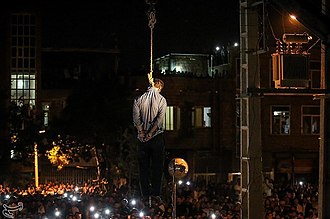Share
Human Rights Voices
While the UN devotes its human rights operations to the demonization of the democratic state of Israel above all others and condemns the United States more often than the vast majority of non-democracies around the world, the voices of real victims around the world must be heard.
Iran, June 8, 2022
Iran hangs 12 inmates including woman in mass execution as NGO fears minorities targeted
Original source
Iran has carried out a mass execution of twelve inmates at a prison in the southeast, an NGO said on Tuesday.
Eleven men and one woman, all convicted either on drugs-related or murder charges, were hanged on Monday morning in the main prison of Zahedan in Sistan-Baluchestan province close to the borders with Afghanistan and Pakistan, Norway-based Iran Human Rights (IHR) said.
The woman identified only with the last name, Gergich, was hanged with the men following being taken to solitary confinement on Saturday, June 4.
Iran has the world’s highest number of executions of women, with at least 18 women in 2021 the NCRI Women’s Committee said.
All those executed were of the Baluch ethnic minority who mainly adhere to Sunni Islam, rather than the Shiism that is dominant in Iran.
Activists have long voiced concern that executions in Iran disproportionately target members of Iran’s ethnic and religious minorities, notably Kurds in the northwest, Arabs in the southwest and Baluch in the southeast.
Data from the Iran Human Rights group shows that Baluch prisoners accounted for 21 percent of all executions in 2021 while representing just 2–6 per cent of Iran’s population.
The news comes as Human Rights Watch published a landmark report on executions in Iran. Overwhelming evidence establishes that Iranian authorities’ mass execution of thousands of political prisoners in 1988 amounts to crimes against humanity.
There has also been concern among human rights groups over a recent uptick of executions in Iran, as the country’s leaders are confronted with protests over a cost of living crisis.
Amnesty International's annual report on the use of the death penalty worldwide, said executions in 2021 rose by 28 per cent in Iran, totalling 314 for the year, but warned that the figure was likely an underestimate.
They particularly rose after hardline cleric Ebrahim Raisi was elected president.
In October, a UN human rights expert warned the BBC that almost all executions in Iran were "an arbitrary deprivation of life."
Under Iran's penal code, citizens can be executed for crimes that are not considered "the most serious" under international law, such as drug trafficking.
The month preceding President Raisi's election victory, saw the most executions, at 51.
People have called on Western powers to address Iran's death penalty record and other human rights violations as part of their negotiations over the 2015 Iranian nuclear deal.
“We cannot sacrifice human rights at the mantle of the nuclear negotiations with the Islamic Republic,” said Hadi Ghaemi, Centre for Human Rights Iran executive director.
He continued: "The Iranian authorities insisted that human rights not be a part of the nuclear negotiations from day one; it is beyond hypocrisy for them to now insist that human rights sanctions should be lifted in order to resume the Iran nuclear deal."

